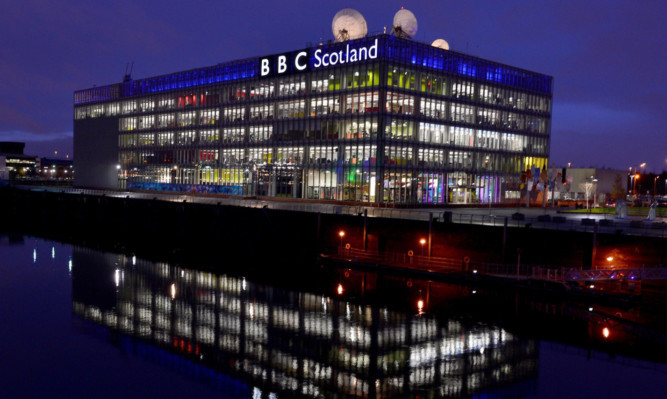It’s 93 years old old and has no long-term future, but that won’t stop bosses at the BBC throwing their full weight behind their bid to save the licence fee.
Arguably suffering the worst reputational damage in its history over the last 10 years with scandal after scandal, not to mention its inability to remain neutral and impartial during the referendum campaign which resulted in protests at BBC Pacific Quay in Glasgow (which is half empty due to job cuts), the BBC is in a vulnerable position as it prepares to enter charter renewal discussions with whichever government is elected in May.
Obviously it’s not all negative: the BBC has dedicated and talented staff. Great documentaries and dramas continue to be made, its children’s programmes are held in high esteem, World Service TV audiences continue to grow and coverage of the London 2012 Olympics was first class.
But it isn’t enough. And people in Scotland feel short-changed.
Research shows that Scottish viewers and listeners have the lowest level of satisfaction with BBC services anywhere in the UK at less than 50%. Evidence also suggests that people in Scotland want more Scottish programming alongside access to the best from the rest of the UK and the wider world.
As the pace heats up towards the next Royal Charter, which is the constitutional basis setting out the public purposes of the BBC, negotiated with the UK Government every 10 years, a lot is at stake.
The House of Commons Culture, Media and Sport Committee report entitled The Future of the BBC had many sensible recommendations. Regarding the licence fee, it said it should ultimately be replaced with a German-style “broadcasting levy” which would apply to every household in Britain, whether they had a TV or not. It also said the licence fee must be amended to address the anomaly that you don’t need a licence to watch content on BBC iPlayer.
What the report missed, however, was how the BBC has completely dropped the ball in Scotland. On Scottish soil the argument is more profound than whether we move to a subscription-based model or reform the licence fee. It’s whether we should have a licence fee at all. Indeed, following the referendum many people decided to stop paying it in protest.
Scotland has historically been underserved by the BBC with record job losses, failing to meet its regional quota on programme production, or even having news that was relevant to the people in Scotland, or in the right order.
In 2011/12 BBC Scotland’s total expenditure was just over £200 million on all of its activities, compared to a contribution to licence fee income of over £320 million from Scotland. And then we have the job cuts and budget reductions through the “Delivering Quality First” programme.
Scotland does not receive its population share of the BBC’s programme-making expenditure for Scottish programming and this cannot go on. BBC Scotland is only allowed to provide something akin to a skeleton media service for its Scottish audience.
Point eight of the Westminster committee report said it “is evident that some areas of the country have received a disproportionately small return of the licence fee which has meant they have missed out on economic activity”. That’s an understatement.
If the SNP return a number of MPs anywhere near the current predictions, their negotiating hand will be stronger in pressing for Scotland to receive a better deal from the BBC.
Clearly their preferred position of a Scottish Broadcasting Service, proposed by the Scottish Government as part of its independence plan, is no longer on the cards.
But what must be argued for is increasing production in Scotland to meet our share of BBC network production (which the Scottish Government continues to make progress in pressing for), for Scotland to see its approximate £350m licence fee raised from over 2.2m households in Scotland spent in Scotland and importantly, for a publicly-funded Scottish Digital Network.
More Scottish public sector broadcasting would increase production in Scotland, reflect Scotland, and increase plurality in publicly-funded public service broadcasting.
The SNP should press the next UK Government to negotiate a digital network for Scotland as part of the BBC charter renewal discussion, funded from the licence fee just as S4C is.
When you enter the BBC’s Broadcasting House, you see the BBC’s motto, inscribed beneath its coat of arms: “Nation shall speak peace unto nation.”
Some may not have liked the demonstrations outside Pacific Quay during the independence referendum, but it was a clear signal of discontent and it would be a mistake to ignore it or put it down to some fringe behaviour by cybernats.
The BBC must let not just Scotland, but all the nations of UK speak with their own voice across all their broadcasting programmes if it is to redress the imbalance and be fit for purpose.
